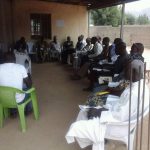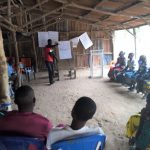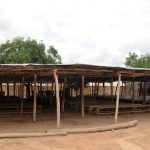There have been new reports of violence and attacks in Northeast Nigeria. Continue to pray for our brothers and sisters as they live in fear but continue to proclaim Jesus Christ as their strength.
As security continues to remain a concern, the EYN Disaster team has provided monetary assistance for the building of a wall which will surround the Kulp Theological Seminary and the church Headquarters area. This project is a huge under taking. Ten teams of block molders helped produce 21,000 blocks. Numerous other volunteers help move the dried blocks to where the bricklayers will construct the wall. Volunteers came from as far away as Maiduguri.
EYN Peace Program continues to work on trauma consciousness and resilience training. In February, workshops were held to measure the work of the newly trained Community Based Facilitators and encouraged these volunteers at the local level. The Community Based Facilitators are local volunteers who have been trained to assist others in dealing with the extreme trauma everyone is facing. As listeners, they give people a chance to share their stories. They also teach some of the principles of trauma and encourage the forgiveness and resilience needed to live under such difficult circumstances. Four workshops took place in areas where Boko Haram are still active (Wagga, Madagali, Gulak and Midlu). The Peace program leaders had to travel back and forth from Michika each day as it was not safe to sleep in the towns holding the trainings.
All the churches in this eastern area of EYN have been burned and yet the churches continue to worship under temporary shelters. 81 facilitators, 22 females and 59 males, attended the four workshops; that’s 81 people at the local level trained to guide others through their trauma. Pray for all these volunteers and their trainers as they engage in such important work.









